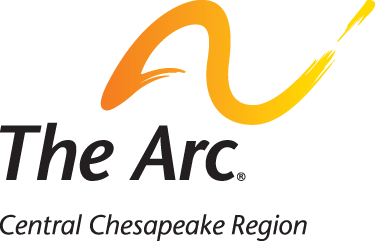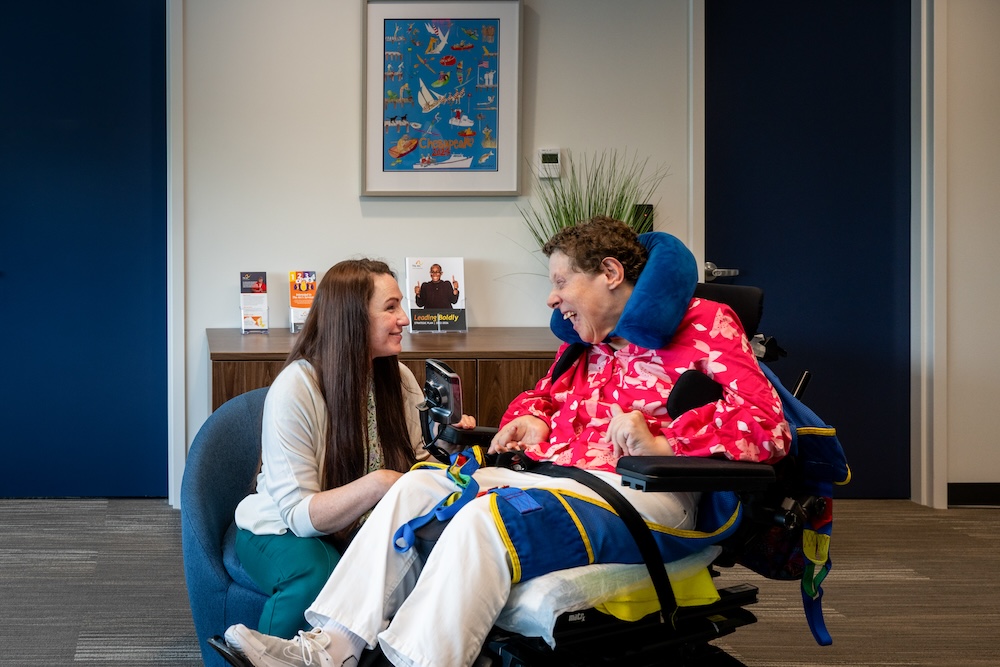Annual Report 2023
|
Leave your Legacy
When you donate today you play a crucial role in supporting The Arc Central Chesapeake Regions work in the community now. But what if you want to make a gift that will impact your community for years and decades to come and leave a lasting legacy?
Making a planned gift is a simple and accessible way to make a lasting impact on both your community and The Arc. Whether that’s through a bequest or by designating The Arc as a remainder beneficiary, you have the power to shape the future of your community. When you leave a gift to The Arc through your estate, you become part of our Hake Society.
We hope you’ll be inspired by the real stories of three transformational gifts from members of the Hake Society. See how your gift could make a similar, lasting impact on our community.
The Hake Trust
The Hake family helped bring The Arc’s Severn campus to life by designating The Arc as the remainder beneficiary of their son’s Special Needs Trust. They generously left $800,000 to support The Arc’s future growth. This gift allowed The Arc to invest in the physical space we needed as we grew to meet the needs of the community.
Linda & Brad Ferrier
After their son was diagnosed with autism, Linda and Brad Ferrier built a system of support for their family and then used their knowledge and experience to help others do the same. Linda and Brad were also planners and left The Arc a bequest in their will and a gift through their IRA, totaling $219,000.
Their gift allowed The Arc to create the first Community Hub in Anne Arundel County, a place to gather and recharge, providing the fully accessible resources people with a disability need to be active daily in their community. Linda and Brad designated a portion of their gift to support the continuing education of Direct Support Professionals, acknowledging the support they received for their son and the critical role that they play in empowering people with disabilities to be as independent as possible.
Nancy Bauer
Nancy Bauer helped bring clarity and resources to countless families by designating The Arc as a remainder beneficiary of her life insurance policy. With her $18,000 bequest, The Arc was able to respond to a genuine need in the community – supporting parents to advocate for their school-aged children, ensuring that kids have a strong foundation of support early in their lives.
Nancy’s legacy is Project Learn, a program that educates parents on the complex resources available through the school system, and Project Leadership Learn Academy, which empowers middle and high school students to take ownership of their services.
We can help you leave your legacy; start by having a conversation with our team today.
Breaking Ground in Innovative Healthcare
How The Arc is providing mental health support for people with intellectual and developmental disabilities.
Open dialogue can change lives and create safe and healthy communities. People deserve to discuss their struggles with mental health without judgment and should feel empowered to ask for help when needed.
People with intellectual and developmental disabilities often have co-occurring mental health and disability diagnoses and experience frequent mental health distress almost five times as often as adults without disabilities.
In 2020, in response to the pandemic, The Arc received a small grant to start ‘Coping with COVID.’ These small group therapy sessions, led by nationally recognized psychologist Dr. Karyn Harvey, began as a way for people with IDD to process their emotions about the pandemic but quickly progressed to deeper conversations. Finally, with a platform and an environment where they felt supported and welcomed, people opened up. They discussed how to come out to their parents, their desire for intimate relationships, how they were dealing with the death of loved ones, and how to take greater control over decisions in their everyday lives.
Realizing the need for deeper, more robust mental health services tailored specifically to people with IDD – The Arc developed its unique approach to Behavioral Health. The Arc’s approach is a shift in thinking about the connection between behavior and health. This holistic approach considers the person’s whole life, not a narrowed-down assessment that isolates their behavior from their experiences.
This program uses licensed clinicians and focuses not on managing specific behaviors but on the necessary mental health counseling and other clinical supports that go along with it. Clinicians deliver individual and group therapies through the lens of trauma-informed care, supporting people with the tools they need to navigate life’s many moments.
By addressing the underlying mental health issues and/or trauma, The Arc’s clinical team and direct support professionals can do much more than manage behaviors. Through creative problem-solving and consistent communication, they set a tone encouraging daily success for people with IDD to live their lives on their own terms. Each outcome has created a better quality of life for that person.
Providing a tailored mental health experience for people with disabilities is important work, and it’s not without its challenges. The Arc receives frequent requests from the community for tailored mental health resources for people with intellectual and developmental disabilities. People want to be seen and heard but are reluctant to participate in counseling.
Over the last three years, The Arc’s clinical team has done extensive relationship building – understanding that a strong partnership between the person and their therapist is the foundation for future success. “We work really hard to make people feel like this isn’t a medical appointment or like they’re going to the doctor’s office,” said Cindy Lindgren, Senior Director of Behavioral Health. “This is a conversation with someone you trust. We’re not trying to ‘fix’ you; we’re trying to understand and help you understand yourself.”
One of the most significant challenges is getting people to participate. “We didn’t realize how reluctant people would be to participate at first,” said Lindgren. “People are incredibly traumatized by past experiences with therapy.”
Our society doesn’t prioritize mental health. There is a stigma around asking for help and a lack of understanding about what mental health and therapy can and should be. Inaccurate or misleading representations of mental health and negative previous experiences contribute to people’s hesitancy to seek support. Additionally, support for people with intellectual and developmental disabilities tends to focus on negative behaviors. They are treated as a problem, not a person.
Instead of healthcare that pathologizes, The Arc’s team seeks to truly understand. We do not enter new relationships assuming the person needs to be “fixed” or that they are “wrong” in some way. We enter the relationship to understand the behaviors that are getting in their way and interfering with the type of life they want to lead. Together with that person, The Arc’s clinical team plans how to move forward with the support of their community, giving people the tools and coping mechanisms they can rely on.
Behavioral Health is a core pillar of The Arc’s strategic plan, Leading Boldly. The program will receive $250,000 in federal investments to significantly grow the clinical team over the next two years. The federal funding was secured through the Fiscal Year 2023 Omnibus Appropriations Bill by U.S. Senators Ben Cardin and Chris Van Hollen.
As The Arc’s geographic footprint expands (with offices in Annapolis, Easton, Severn, and Linthicum), behavioral health counseling studios and suites are embedded within each location. This physical space provides room for people to seek in-person support, as well as providing the infrastructure needed to support people throughout the region.
When asked where The Arc will be in the next few years, Lingren has grand visions. “First and foremost – I want people to be comfortable seeking therapy and know that we are here to be a resource for them,” she said. “And when I say that, I meant for families and children too. In the next two years, we will support children with intellectual and developmental disabilities and adults.”
Clara:
Moving is consistently rated as one of life’s most stressful transitions. In her mid-thirties, Clara moved away from her family for the first time into a home supported by The Arc.
It wasn’t an easy adjustment for Clara. She became overwhelmed by the process and began lashing out.
Making new friends and being involved in the community was important to Clara, but how she responded to the stress of the move was keeping her from reaching those goals.
Clara’s team encouraged her to give Behavioral Health a try. She developed a close relationship with her therapist, who was able to work with Clara and her team to tailor a Behavior Support plan. In addition to coping techniques she used in therapy, Clara’s plan included finding things she was interested in and engaging in the community.
Clara’s team supported her to join Zumba and a book club. Now, Clara feels more connected with the people around her. She even joked with her therapist about her stress, saying she “didn’t need to do those things anymore.”
The Arc Takes on Calendar Day – 2024
The crisp, sunny Thursday morning marked the second day of the 2024 Legislative Session. The air was buzzing with excitement as legislators briskly walked across Lawyer’s Mall to the State House for the morning Sessions in the House and Senate Chambers. Amidst the bustle, advocates from Arc chapters throughout the State rallied together on the Mall to prepare for a day of advocacy and education.
Every January, The Arc Chapters across Maryland assemble in Annapolis on the second day of the Legislative Session to raise awareness and advocate for the rights and well-being of people with intellectual and developmental disabilities (IDD). The Arc Maryland has branded the day Calendar Day. Each chapter visits the legislators that represent their region, distributing calendars that contain stories of the impact of The Arc throughout the State by highlighting people with IDD and their families. Additionally, the calendar includes holidays, special chapter events, legislative events, and – a staff favorite – legislators’ birthdays.
Calendar Day is a tradition that captures the essence of The Arc. Since its founding, The Arc has been a grassroots organization with its core mission to advocate for better lives for people with IDD. Calendar Day is a chance for The Arc community to advocate for political and social change.
On Thursday, 15 members of The Arc Central Chesapeake Region gathered to distribute calendars to The Arc’s legislative representatives from Anne Arundel, Caroline, Dorchester, Kent, Talbot, Queen Anne’s, Somerset, Worcester, and Wicomico counties.
The Arc Central Chesapeake Region’s calendar story highlighted our groundbreaking work in Behavioral Health, as well as the naming of Clara Baker to Governor Wes Moore’s Maryland Commission on Behavioral Health Care Treatment and Access.
The Maryland General Assembly is the elected legislative body that represents the people of Maryland. The State has 47 legislative districts represented by 47 Senators and 141 Delegates. The General Assembly meets at the same time every year for 90 calendar days beginning the second Wednesday in January to act on more than 2500 pieces of legislation and the State’s annual capital and operating budgets. The role of The General Assembly includes passing laws that benefit Marylanders and proposing amendments to Maryland’s constitution.
You can find The Arc’s 2024 public policy priorities here as we continue the legacy of advocating for people with IDD.
If you have any questions about the legislative session or The Arc’s public policy priorities, please do not hesitate to reach out to Rylie Shewbridge, Director of Government Relations, at rshewbridge@thearcccr.org.




